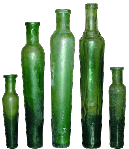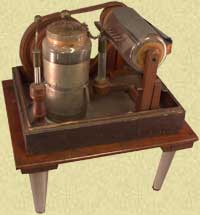History often tangles us up in battles, polemics and gods. Not so the story of the Wistar family, from their colonial Philadelphia and West New Jersey businesses through the DNA passed today between lab rats. Although the family lacks its former “household name” status, the Wistars remain among the most celebrated families to have called the middle colonies and Mid-Atlantic States home. Wistar genealogy and social circles spin you through names like Franklin, Bache, Trist, and Jefferson, to name but a few. Family members built fortunes though business, rose to international prominence for medical and scientific achievements, received accolades for their philanthropy, chaired learned societies, ascended the ranks of Freemasonry and exposed social injustice, becoming particularly vocal during abolition and prison reform debates.
Caspar Wistar and America‘s First Profitable Glass Factory
Caspar was the first Wistar to emigrate from Germany to America. He arrived in 1717, virtually broke, with nine pence and a rifle, and settled in the area between Berks County and Philadelphia. Caspar, always industrious, made soap, and bootstrapped and brokered real estate deals to save enough to purchase a furnace and, next, a forge in Berks County. With the forge, Caspar built a very profitable business, manufacturing high quality brass buttons, a staple of period apparel.
 The rising young businessman joined the Society of Friends and married wisely, wedding a wealthy Quaker, Catherine Jansen. Associating with the Society of Friends would prove opportune, especially during the middle years of operations at the Wistar Glass Works in Wistarburgh, in Salem County, New Jersey. At Wistarburgh, Caspar built the very first glass factory in America to achieve sustained profitability.
The rising young businessman joined the Society of Friends and married wisely, wedding a wealthy Quaker, Catherine Jansen. Associating with the Society of Friends would prove opportune, especially during the middle years of operations at the Wistar Glass Works in Wistarburgh, in Salem County, New Jersey. At Wistarburgh, Caspar built the very first glass factory in America to achieve sustained profitability.
Caspar opened a retail store on Market Street in Philadelphia, quite close to the home of Ben Franklin, with whom he became good friends. Caspar died one of the leading merchants and wealthiest men in the middle colonies, thanks to the button and brass works, sagacious real estate speculation, the landmark Wistarburgh glass business, and family operated retail outlets in New Jersey and New York. Caspar’s brother, Richard Wistar, ran the New York store.
Wistarburgh pane glass and bottles were common in homes and businesses throughout the middle colonies. Wistar glass also enjoys the historic and scientific honor of having been made to specification for Benjamin Franklin, who incorporated Wistar glass in a variety of devices he designed for his experiments in electricity. Franklin tested his first lightning rod at Caspar Wistar’s house.











